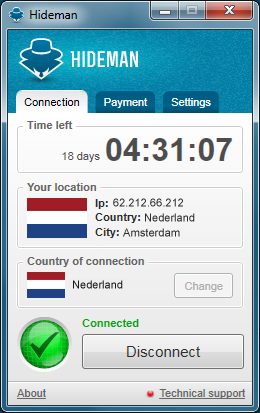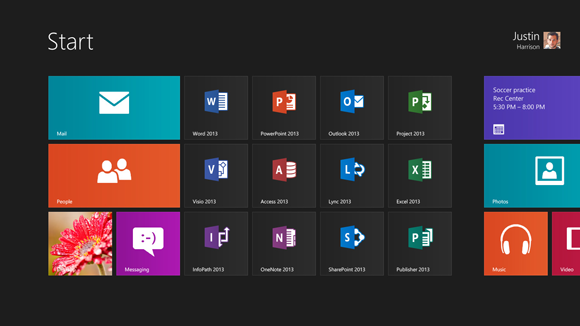
Cool the summer heat with one of these 24 software downloads
It’s the end of another month and the end of another busy week of software releases. If you’ve been too caught up with other things to keep an eye on the titles that have been hitting the download servers over the past seven days, this roundup will bring you up to speed.
Tomahawk 0.5.5 is a social media player that enables you to play your local music collection as well as tracks from the web, and also enables you to browse through the collections of your friends. If you’re keen to share your musical taste with your friends, look no further than ON AIR 4.0.0.834, which will automatically update your Skype status with the track you are currently listening to.

LinkedIn and Facebook join forces with Microsoft Office in the cloud
One of the new features of Office 2010 (yep that’s 2010) was the Outlook Social Connector. This addon brought with it the ability to display social network information within Outlook itself. It took a little while for developers to get on board but last time I checked you could download "providers" to integrate Facebook, LinkedIn, Windows Live and Xing data.
Well, Office 2013 is now with us, and the social connector has been improved further. You no longer need to download a specific "provider" for Facebook or LinkedIn. Simply sign in with your existing credentials and Outlook 2013 will pull through the relevant data.

PC-era dinosaurs: Beware the BYOD Extinction Level Event
Ah! Life in paradise. As the literal incarnation of the mythical "guy who ran away to a tropical island", I've had the joy of returning to my once primary (and now mostly vacation) home in the United States only to discover all of the things that can go wrong with an empty house in the Florida heat (this time, it was a failed A/C compressor -- ugh!).
However, I've also had the opportunity to revisit many of my core IT beliefs from the perspective of a relative outsider living in the slower-paced world of coconuts, litches and 2Mbps ADSL connections. Basically, my geographic isolation has forced me to take the long view on new technology trends. Which is why I'm so excited about the potential of BYOD: I see the emergence of the Post-PC phenomenon as a truly disruptive force that will forever change how people view "computers".

Tomahawk makes music more social
If you are a music fan, you’ll undoubtedly have an extensive collection of MP3s and other music files on your hard drive. It is also likely that you listen to music on Spotify and Sound Cloud, and perhaps watch the occasional music video on YouTube. Tomahawk is a music player that enables you to access all of this and more in one handy application but there is a social focus to the player that opens up some interesting options.
Software that broadcasts information about the music you are listening to is nothing new, but this is a feature that you will find in Tomahawk. The program will scour your hard drives for music files and create a library for you. As you listen to your collection, Tomahawk enables you to view artist information and discover related artists that you may be interested in. This is all well and good, but it is the social aspect of Tomahawk that is especially interesting.

BitTorrent: Entertainment's future is free, and includes RealPlayer
How do you monetize a technology that is hard to monetize? BitTorrent, the company behind all things torrent and the uTorrent client has several answers for that. Not long ago it began to offer the uTorrent Plus client that added features like antivirus protection, a build-in media player or a media converter for a price to the uTorrent program.
But that did not really solve the question that artists and other members of the entertainment industry were asking: how are they going to monetize their content using BitTorrent?

Hideman cloaks your IP address
VPN clients are a generally a very good way to maintain your anonymity online, and Hideman is no exception: just launch the program, click the Connect button and in a second or two you’ll be allocated an IP address in another country.
Which country? Hideman provides servers in Australia, Canada, Czech Republic, France, Germany, Netherlands, Panama, Russia, Singapore, Ukraine, United Kingdom and United States.

VMware acquires virtual networking software company Nicira for $1.05 billion
On the same day as reporting strong second-quarter results, virtualization software developer VMware said Monday that it has entered into an agreement to purchase network software Nicira for $1.05 billion. The company's software is used to manage network deployments and create virtualized network infrastructure. VMware expects the deal to close in the second half of the year.
"The acquisition of Nicira adds to our portfolio of networking assets and positions VMware to be the industry leader in software-defined networking", VMware CEO Paul Maritz says. Others called it a major move which positions VMware well in the fast-growing cloud computing sector.

Want the benefits of Firefox but more security? Try Comodo IceDragon 13.0.3.0
Going online means having to decide which web browser you’re going to use to find your way around the Internet. If security is your primary concern, a new browser just entered the arena and vies for attention. If Comodo IceDragon sounds familiar, you’ve probably been put in mind of Comodo Dragon, the security focused web browser based on Chromium. IceDragon is very much the same idea but this time around there is a Mozilla core.
Comodo have recognized that not everyone wants to use the same web browser just to get the benefits of added security, and Chrome is not a browser that suits everyone. The unveiling of a Mozilla based version of the same tool opens up a world of more secure web browsing to a wider audience. If you are already a Firefox user, you’ll be pleased to find that your bookmarks history, passwords and more can be imported into IceDragon.

8 things Marissa Mayer needs to do at Yahoo NOW
Pundits can't seem to glow enough about Yahoo's new CEO, who has been on the job for less than a week. Marissa Mayer is a Google darling flown the coop and swooped in just as Yahoo shocked shareholders with another quarter of disappointing performance.
It's get to work time, and we've got a to-do list for Mayer -- eight things she should do as soon as humanly possible.

A (p)review of Microsoft Office 2013
Microsoft released the preview version of Office 2013 less than a week ago. This new installment of the productivity suite has many of the same features as its previous versions, 2003, 2007, and 2010: Word, Excel, Access, PowerPoint, and Outlook. But there are other programs as well, and Microsoft has connected the Office Suite to the Azure Cloud.
In this review I’ll discuss the requirements for installation and the installation process. I’ll also discuss the contents of three of the Office 2013 suite programs, Word, Excel and PowerPoint, and how the cloud-based Office 365 may change the way many users work with the suite. I’ll also talk about Windows 8 integration, and wrap up with a discussion about the impact that Office 2013 can have in business enterprises.

36 software downloads you shouldn't miss this week
This has been another action-packed week for software releases, but it is one dominated by one name -- Microsoft Office 2013 Consumer Preview. The latest version of Microsoft’s office suite has received a public preview, meaning that anyone keen to get a glimpse of the Windows 8-friendly, metro-interface suite can do so right now.
Olympic fever is starting to take hold and two new mobile apps BBC Olympics 1.0.0 (UK ONLY) and London 2012: Official Join In App for the Olympic and Paralympic Games 2.0 have been released to help you to keep up to date with the latest news and events, whether you are attending or not.

Well done Microsoft for bringing Office closer to the cloud
One of the areas of this week's Office 2013 launch that received slightly less attention as the updated Office Web Apps. These are the light weight web counterparts of the ‘full fat’ desktop applications, and are Microsoft's answer to Google Docs. Existing users of Skydrive, Office 365, or SharePoint 2010 will be familiar with them.
The apps received various updates, some major and many minor. Most obvious is the Metro look and feel, in line with everything else you have seen of Office 2013. Excel gains the ability to insert forms, PowerPoint sees its rendering engine markedly improved, and OneNote doesn’t seem to get anything other than a lick of paint. All in all its an incremental improvement, and certainly nothing to make happy Google Docs users sit up and take notice.

Avira Protection Cloud 'technical preview' released -- get it NOW!
Avira has released a first public “technical preview” of Avira Protection Cloud, a simple cloud-based tool for detecting malware.
And we really do mean simple. There are no menus here, no toolbars, no options, settings anything else: all you have to do is launch the program, click “Cloud Scan” and wait for the results.

Which Firefox is right for you -- 14, 15, 16 or 17?
The recent release of Firefox 14 FINAL means the whole developmental cycle has moved on again, and as expected versions 15 (Beta), 16 (Aurora) and 17 (Nightly/UX) of Mozilla’s web browser have made their first appearances. Version 14 was a relatively minor release after the excitement of version 13, but versions 15 and 16 both promise some exciting new features as we reveal below.
Get a head’s up on what’s coming and discover which build is best for your personal needs with our updated guide to what the future holds in store for Firefox.

Microsoft Q4 2012 by the numbers: $6.2B charge saps record quarter
Microsoft closed its fiscal year in relatively good shape, despite globally slow PC sales that weighed down Windows division sales and product transition period that affected some others. The Redmond, Wash.-based company has a heap load of new products in queue for the next three quarters, causing some customers to delay purchases.
However, a one-time $6.19 billion impairment goodwill charge, related to the Online Services Business, and $540 million deferral led Microsoft to post a 6 cents-per-share loss -- or $492 million, after taxes. The deferral covers upgrade guarantees related to Windows 8's launch.
